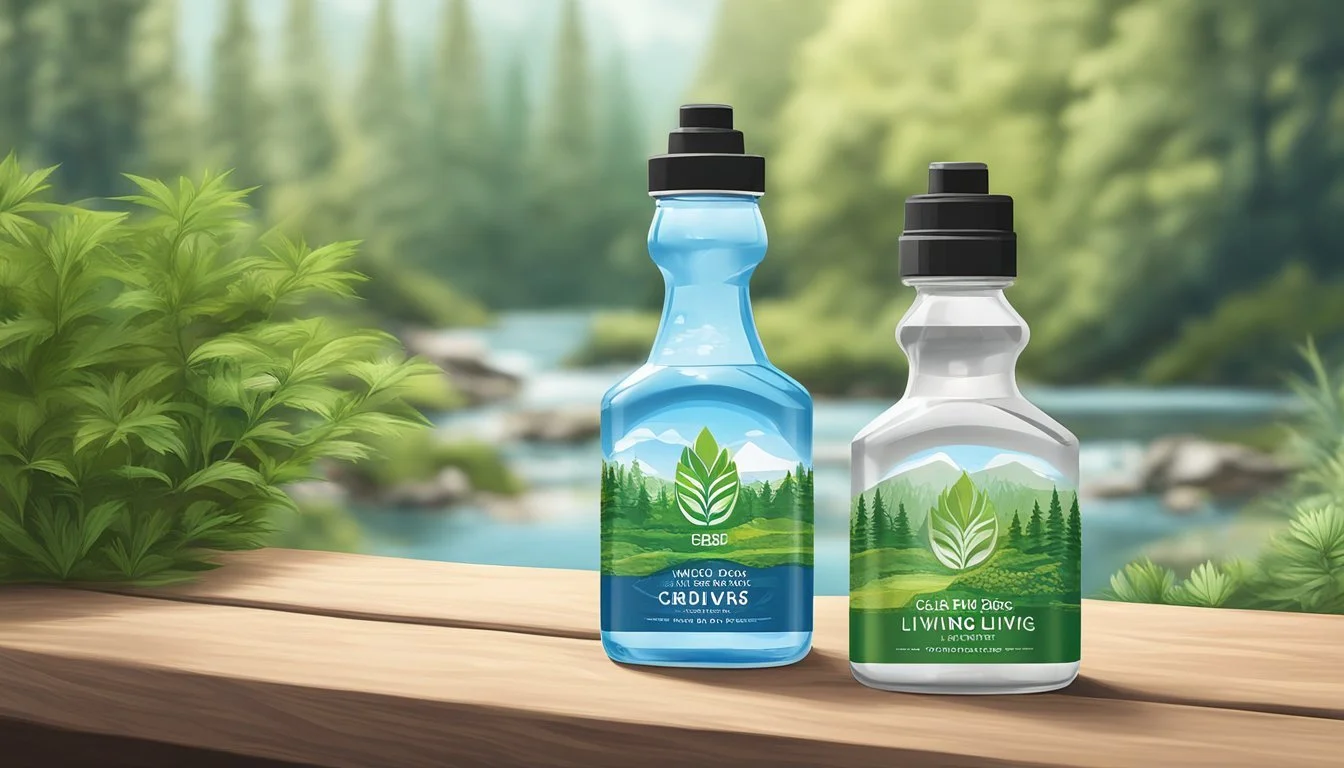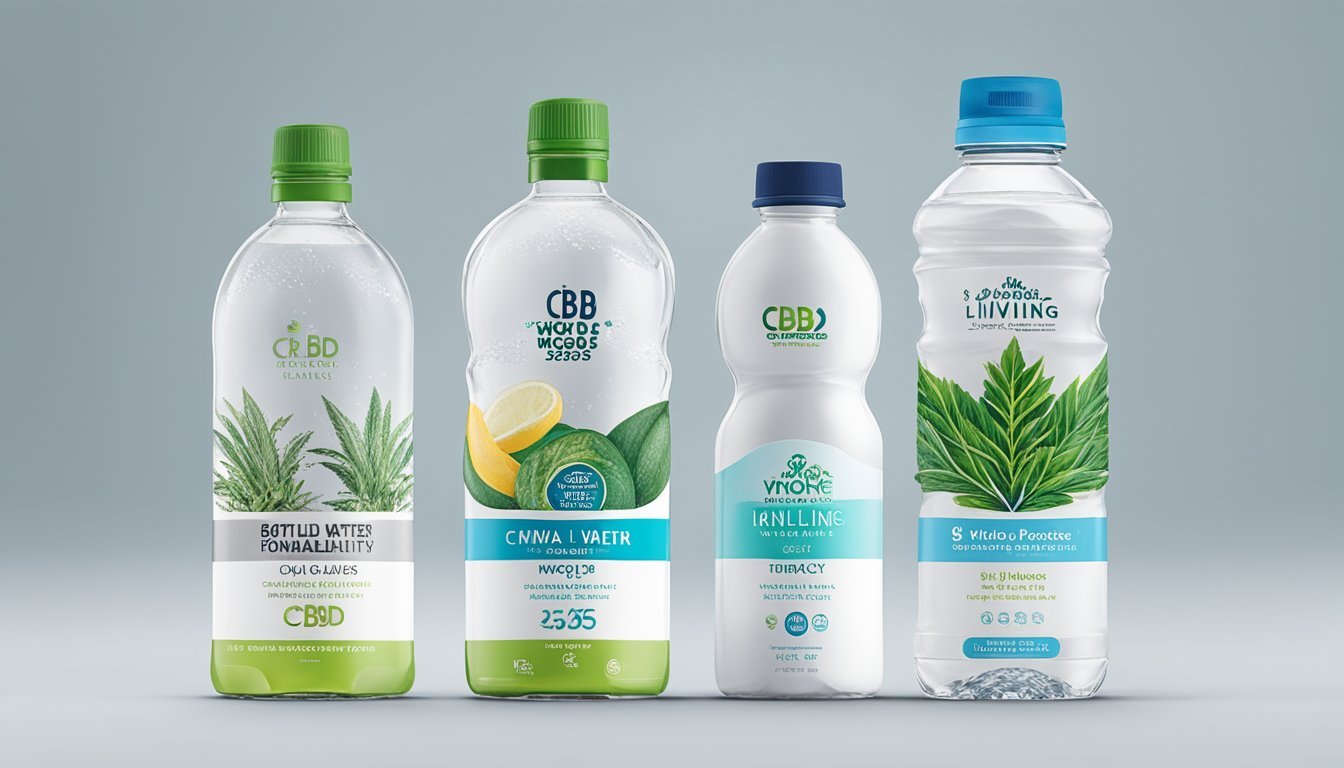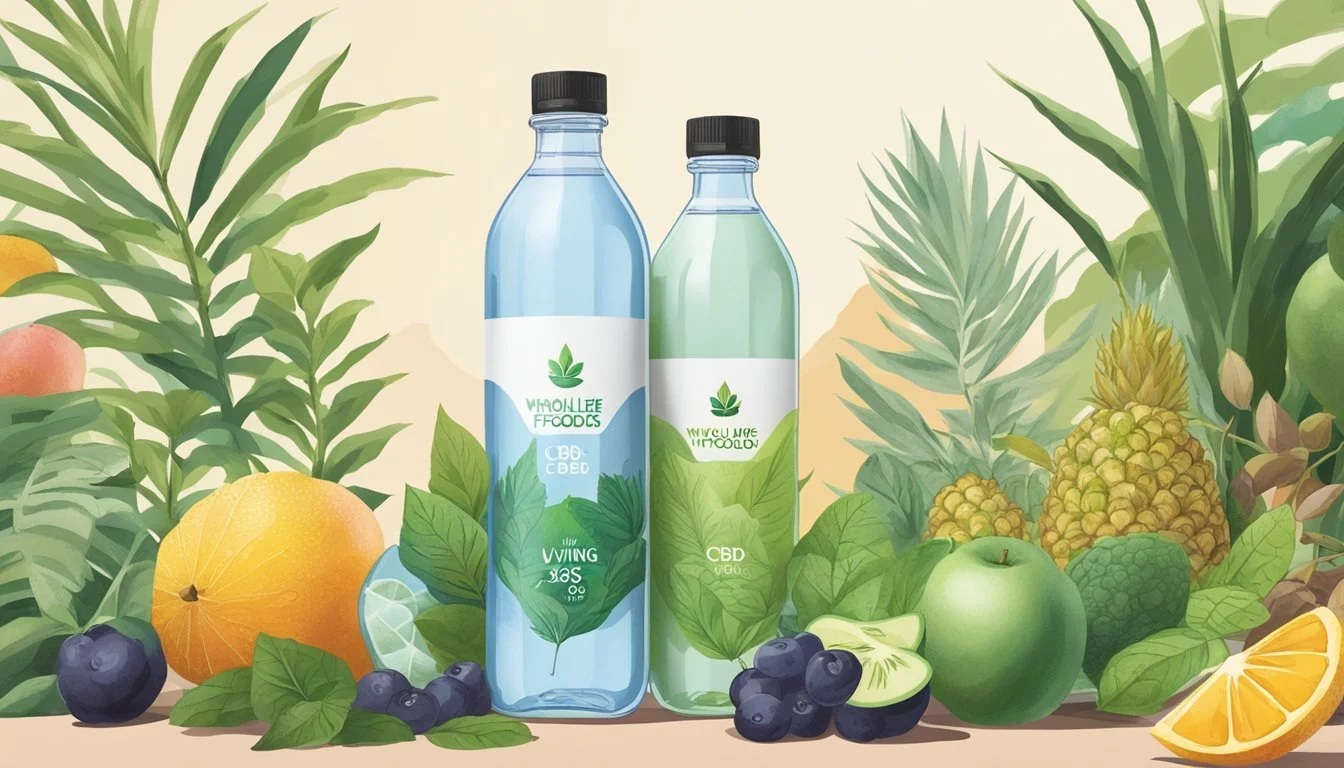Whole Foods 365 vs. CBD Living
Bottled Water Showdown
When it comes to bottled water, people are often torn between choices that promise quality hydration and additional health benefits. Whole Foods 365 offers an affordable range with options like electrolyte and alkaline water, making it a go-to for those looking for cost-effective hydration solutions. For a clean, crisp taste without breaking the bank, Whole Foods 365 is a reliable choice.
On the other hand, CBD Living provides water that doesn’t just hydrate but also includes the added potential benefits of cannabidiol (CBD). Infused with 10 mg of organic CBD, this water claims to offer a calming effect, making it an attractive option for those interested in incorporating CBD into their lifestyle. If you're seeking an extra boost for your wellness routine, CBD Living may be the better pick.
The decision between Whole Foods 365 and CBD Living boils down to your personal hydration needs and lifestyle preferences. Both brands offer unique advantages, but the choice depends on whether you prioritize affordability and straightforward hydration or are open to paying a premium for the added benefits of CBD.
Overview of Whole Foods 365 and CBD Living Waters
Whole Foods 365 and CBD Living both offer bottled water options, catering to consumers seeking hydration and health benefits. Each brand has a unique history and distinct product offerings that appeal to different preferences and needs.
Brand Histories
Whole Foods 365 is a line under the Whole Foods Market, known for its commitment to natural and organic products.
Founded with a focus on quality and affordability, Whole Foods 365 products aim to make healthy living accessible. Their bottled water, particularly the spring water, is sourced from natural springs and processed minimally to retain its natural minerals.
CBD Living was established to integrate cannabidiol (CBD) into everyday products, including bottled water. Meeting the demands for health-conscious choices, they offer CBD-infused water, tapping into the market for products with potential therapeutic benefits. The brand promotes the refreshing and hydrating properties of its water enriched with broad-spectrum CBD, promising an innovative way to enhance wellness.
Product Range
Whole Foods 365 provides a variety of bottled water types including spring, alkaline, and electrolyte water. Their spring water is noted for its clean and straightforward taste, sourced from natural springs and priced competitively.
Their alkaline and electrolyte waters cater to consumers looking for specific hydration and mineral balances, ranging from $0.79 to $1.29 per bottle.
CBD Living focuses on CBD-infused beverages, with its water being one of the flagship products. Each bottle is infused with broad-spectrum CBD, aiming to combine hydration with the potential benefits of CBD.
Priced higher than regular bottled water, it is marketed for its refreshing quality and health benefits, appealing to those seeking wellness through natural and organic choices. Each bottle of CBD Living Water often costs around $3.99, reflecting its specialized market segment.
Composition and Purity of Water
In comparing Whole Foods 365 and CBD Living bottled water, it is critical to examine their mineral content, pH levels, and any potential contaminants. Understanding these elements helps determine the quality and purity of each brand.
Mineral Content and Electrolytes
The mineral content of bottled water influences its taste and health benefits. Whole Foods 365 is a spring water, meaning it naturally contains minerals like calcium, magnesium, and potassium. These minerals contribute to hydration and overall health.
CBD Living, on the other hand, is purified water with added CBD. The purification process often involves removing most minerals, but minerals and electrolytes might be added back in controlled amounts. This brand’s key feature is its infusion with CBD, which does not naturally occur in mineral-rich waters.
Comparatively, Whole Foods 365’s natural mineral content provides more consistent electrolyte levels, which might be beneficial for those looking for a mineral-rich option. Lists and tables can be helpful to show differences in mineral content.
PH Levels and Alkalinity
The pH level of water is an indicator of its acidity or alkalinity. Whole Foods 365 exhibits a neutral to slightly alkaline pH, typically around 7.0 to 8.0. Alkaline water proponents argue it helps in neutralizing acid in the bloodstream and improving overall health, although scientific consensus is varied.
CBD Living water also has a neutral pH since it undergoes extensive purification processes. Its pH is carefully controlled to ensure it remains neutral, aligning well with average pH levels of the human body.
Consumers favoring water that can potentially aid in maintaining bodily pH balance might prefer Whole Foods 365. Both brands, however, are well-balanced in pH.
Testing for Contaminants
Testing for contaminants is crucial for ensuring water quality and safety. Whole Foods 365, as a spring water, undergoes rigorous tests to meet FDA standards. These tests screen for harmful substances like lead, arsenic, and cadmium. Being free from PFAS chemicals and other contaminants enhances its reputation for purity.
CBD Living, as a purified water, also adheres to stringent purification protocols. It must ensure the complete removal of contaminants through methods like reverse osmosis. These processes aim to eliminate heavy metals and other impurities, complying with FDA and industry voluntary guidance.
Both brands strive to meet high standards for purity and safety, though the methods and results of their processes may differ.
Health Impact and Benefits
The health impact and benefits of Whole Foods 365 and CBD Living bottled water are significant, especially concerning hydration and wellness, as well as the potential effects of CBD.
Hydration and Wellness
Whole Foods 365 bottled water offers a clean and natural option for hydration. It is sourced with a focus on purity and environmental responsibility, providing essential hydration without additives. Regular hydration is crucial for maintaining bodily functions, supporting metabolism, and promoting overall wellness.
Hydrated individuals often experience better concentration, energy levels, and improved physical performance. Whole Foods 365 water is a suitable choice for those prioritizing a clean, natural lifestyle, free from unnecessary chemicals.
Consuming this brand regularly may aid in detoxification, facilitating the removal of toxins and supporting kidney function. Its natural and pure composition makes it a reliable daily hydration source for individuals of all lifestyles.
Potential Effects of CBD
CBD Living bottled water introduces the added component of cannabidiol (CBD), known for its potential health benefits. Each bottle contains a specific dose of CBD, targeting wellness beyond mere hydration. This could be appealing for those seeking to incorporate wellness supplements effectively into their routine.
CBD is renowned for its anti-inflammatory properties, aiding in the reduction of inflammation and potentially benefiting those with chronic pain conditions or arthritis. Additionally, some studies suggest that CBD may help with anxiety, stress relief, and possibly even cancer symptoms.
For users already on medications, incorporating CBD water should be discussed with healthcare professionals to avoid interactions. This infusion offers a targeted approach for users aiming to enhance their health and wellness actively.
Environmental and Sustainability Considerations
When comparing Whole Foods 365 and CBD Living bottled water, it is essential to look into their environmental and sustainability efforts. Key areas of focus include bottling processes, packaging, water sources, and conservation practices.
Bottling Processes and Packaging
Whole Foods 365 emphasizes environmentally friendly practices by using reusable and recyclable materials. Their bottles are made from recycled plastic, which reduces waste in landfills. The brand has also explored the use of glass bottles for some of its premium water products, promoting sustainability by reducing plastic pollution.
CBD Living also commits to sustainable packaging. Their bottling process uses BPA-free plastic, ensuring safety for consumers and the planet. They have plans to introduce eco-friendly packaging options, including glass bottles, to further reduce their carbon footprint. The company also participates in various recycling programs to promote environmental consciousness.
Water Source and Conservation
Whole Foods 365 sources their water primarily from natural springs and artesian wells, ensuring the purity and quality of their product. They actively engage in water conservation efforts, ensuring that the extraction process does not harm the surrounding ecosystems. They monitor water levels and replenish sources when needed.
CBD Living sources its water from clean and sustainable sources, emphasizing the importance of preserving natural resources. The company utilizes advanced water filtration systems to maintain product quality while implementing water-saving technologies. Their conservation initiatives include supporting projects aimed at protecting natural water sources and promoting sustainable water management practices.
By examining these aspects, consumers can make informed decisions based on the environmental and sustainability efforts of these two bottled water brands.
Taste and Water Sommelier Insights
When comparing Whole Foods 365 and CBD Living bottled waters, it's crucial to examine factors such as flavor profile, aftertaste, and expert opinions. The following sections explore these facets in detail.
Flavor Profile and Aftertaste
Whole Foods 365 has a flavor that many describe as sour with a dry aftertaste. The mineral content can be surprising, leaving a not-so-pleasant finish on the palate. In terms of refreshing factors, it might not hit the mark for everyone, often feeling more like purified water than genuine spring water.
CBD Living offers a different experience. It is infused with CBD, which some consumers find soothing. The flavor is generally softer, with a cleaner aftertaste that resonates well with those looking for both hydration and mild relaxation effects without a harsh mineral profile.
Expert Opinions on Bottled Waters
Water sommeliers often have discerning tastes and insights into various bottled waters, including these two brands. Whole Foods 365 has received mixed reviews, with some experts noting its above-average mineral content, which contributes to its distinct dry finish. It’s not as loved for its flavor but is seen as a budget-friendly option.
CBD Living tends to be favored by those who appreciate innovative water brands. Experts have noted its smoother, more enjoyable flavor. The inclusion of CBD appeals to a niche market looking for both health benefits and quality hydration. This dual feature sets it apart from many traditional water brands.
Comparison of Cost and Value
The cost and value of bottled water can be critical factors when choosing between Whole Foods 365 and CBD Living. Here, we will look at their price points and accessibility, and analyze the cost-benefit ratio related to their quality and health benefits.
Price Points and Accessibility
Whole Foods 365 water is known for its affordability. At just 69 cents per bottle, it is a budget-friendly option for everyday hydration. This is especially convenient for shoppers who frequently visit grocery stores like Whole Foods. The low cost makes Whole Foods 365 accessible to a wide demographic.
In contrast, CBD Living water is more expensive. Priced at $3.99 per bottle, it is significantly higher than Whole Foods 365. This cost reflects the added health benefits of CBD, which is infused into the water for those seeking potential therapeutic effects. Despite the high price, it can be accessed in various specialized stores and online retailers.
Analyzing the Cost-Benefit Ratio
When considering cost-benefit, Whole Foods 365 offers decent quality spring water at a low price. The water meets basic hydration needs without breaking the bank, making it ideal for budget-conscious consumers. While it may not offer additional health benefits, its taste and accessibility provide significant value.
CBD Living water, although expensive, includes potential health benefits such as anti-inflammatory properties due to the CBD content. For those who value these additional benefits, the higher cost might be justified. The premium pricing reflects its specialized ingredients and the extra processing needed to infuse CBD effectively.
While Whole Foods 365 appeals to those prioritizing cost and convenience, CBD Living caters to consumers willing to invest in enhanced health benefits. The choice ultimately depends on individual priorities related to budget, quality, and desired health benefits.
Consumer Experience and Lifestyle Alignment
Both Whole Foods 365 and CBD Living bottled water offer unique experiences tailored to different consumer lifestyles. These experiences are reflected in customer reviews and how effectively each brand adapts to various lifestyle needs.
Customer Reviews and Testimonials
Whole Foods 365 garners mixed reviews. Many customers appreciate its cost-effectiveness and simple, refreshing taste, which makes it a reliable option for everyday hydration. Some reviews, however, note a bland or slightly metallic aftertaste. Despite this, the brand’s affordability remains a highlight.
CBD Living receives praise for its innovative approach. Consumers frequently highlight its potential health benefits, such as reduced anxiety and improved relaxation due to the presence of CBD. The higher price point is often justified by these additional benefits and the product's smooth, crisp taste.
Adaptation to Different Consumer Lifestyles
Whole Foods 365 aligns well with individuals seeking affordable, no-frills hydration. Its widespread availability at Whole Foods stores and other retailers adds a layer of convenience. For those prioritizing cost and simplicity, it's a fitting choice.
CBD Living, on the other hand, appeals to consumers who integrate wellness trends into their daily routines. The inclusion of CBD caters to a health-conscious crowd looking for specific benefits beyond basic hydration. Active lifestyles, stress-relief seekers, and those experimenting with cannabidiol are particularly drawn to this brand.
Both brands provide distinct experiences and cater to varied needs, offering something different based on personal preferences and lifestyle choices.
CBD in Bottled Water: Opportunities and Risks
CBD-infused bottled water offers several potential health benefits, as well as some risks and regulatory concerns. The role of CBD in hydration, potential health side effects, and the legal landscape are key areas to consider.
The Role of CBD in Hydration
CBD water leverages nanotechnology to enhance the absorption rate of CBD in the body. This technology breaks CBD into tiny particles, allowing for quicker and more efficient absorption. As a result, users might feel the effects of CBD faster compared to traditional CBD products.
In addition to the potential benefits of CBD, such as reduced anxiety and inflammation, CBD water also provides basic hydration benefits. Staying hydrated is essential for overall health, and CBD water adds a functional twist to regular bottled water. Many people find CBD water refreshing, as it combines the soothing effects of CBD with the immediate benefit of hydration.
Health Risks and Side Effects
While CBD water can offer several health benefits, there are risks and side effects to be aware of. High doses of CBD might result in liver damage, and the interaction with other medications can be problematic. It's crucial to adhere to recommended dosages and consult healthcare providers if using other medications.
Some individuals may experience side effects like fatigue, diarrhea, or changes in appetite. Additionally, the quality of CBD water varies by brand, as not all products have easily accessible Certificates of Analysis (COAs). These COAs are important because they verify the purity and potency of the CBD used. Consumers should be diligent about sourcing CBD water from reputable brands to minimize health risks.
Legal Aspects and FDA Perspective
From a legal standpoint, CBD in bottled water falls under complex regulations. The Food and Drug Administration (FDA) has not officially approved CBD as a dietary supplement, and there's ongoing debate about its safety and efficacy. The FDA offers voluntary guidance but no formal approval for most over-the-counter CBD products.
Moreover, it's important to ensure that the CBD water contains no more than 0.3% THC, in compliance with federal law. Brands must rigorously test their products and provide transparent labeling to maintain consumer trust and adhere to regulations. Consumers should look for products with clear dosage information and COAs to ensure legal compliance and product safety.
Final Thoughts on Bottled Water Selection
When selecting bottled water, various factors come into play. Taste, cost, and additional benefits like CBD infusion are key considerations. Whole Foods 365 offers an affordable option with a spring water source, whereas CBD Living infuses their water with CBD, providing potential wellness benefits.
Taste Preferences
Whole Foods 365: Some find it has a sour, dry aftertaste.
CBD Living: Known for adding 10 mg of organic CBD, offering a distinct flavor and refreshing feel.
Cost Considerations
Whole Foods 365: Priced around 69 cents per bottle.
CBD Living: Significantly more expensive at $3.99 per bottle.
Comparing with other brands:
Smartwater: Popular for its vapor-distilled method and addition of electrolytes.
Core Hydration: Offers balanced pH levels with added electrolytes.
Evian: Sourced from the French Alps, known for its natural mineral content.
Fiji: Bottled at the source in Fiji, preferred for its smooth taste.
Dasani: Purified using reverse osmosis, widely available and affordable.
Aquafina: Similar to Dasani, uses a purification process to ensure clean, crisp taste.
Choosing between Whole Foods 365 and CBD Living depends on what the consumer values more—cost or additional benefits like CBD. Comparing these to brands like Smartwater, Core Hydration, Evian, Fiji, Dasani, and Aquafina can help consumers find the best match for their specific requirements.
More About Whole Foods 365
More About CBD Living
Aqua Carpatica vs CBD Living: Which Bottled Water is Better?
Cascade Mountain vs CBD Living: Which Bottled Water is Better?
Core Hydration vs CBD Living: Which Bottled Water is Better?
Crystal Geyser vs CBD Living: Which Bottled Water is Better?
Hawaii Volcanic vs CBD Living: Which Bottled Water is Better?
Hawaiian Springs vs CBD Living: Which Bottled Water is Better?
Icelandic Glacial vs CBD Living: Which Bottled Water is Better?
Kirkland Signature vs CBD Living: Which Bottled Water is Better?
Mountain Valley Spring Water vs CBD Living: Which Bottled Water is Better?
Nestle Pure Life vs CBD Living: Which Bottled Water is Better?
Richard's Rainwater vs CBD Living: Which Bottled Water is Better?
San Pellegrino vs CBD Living: Which Bottled Water is Better?
Solan de Cabras vs CBD Living: Which Bottled Water is Better?
Talking Rain AQA vs CBD Living: Which Bottled Water is Better?
Whole Foods Italian Still Mineral water vs CBD Living: Which Bottled Water is Better?





